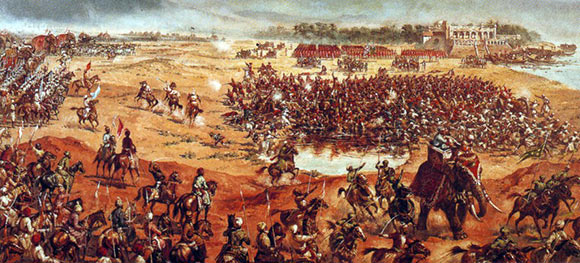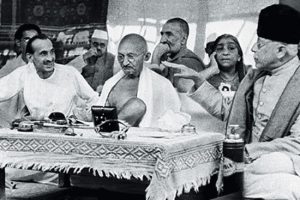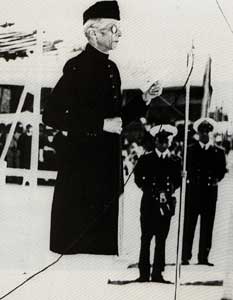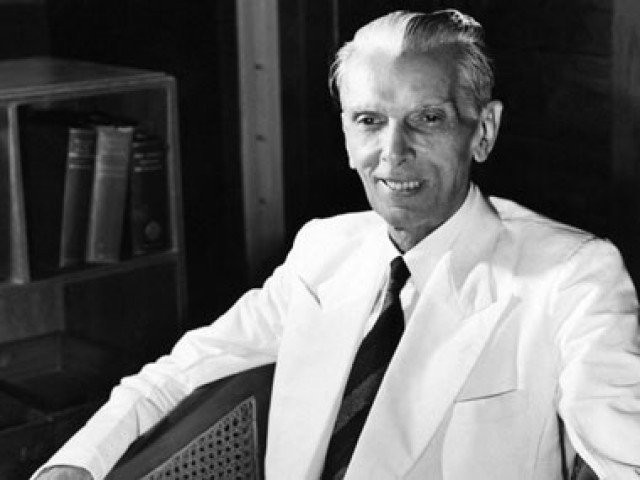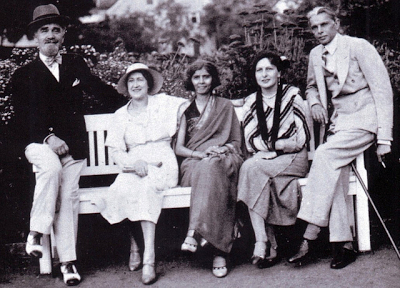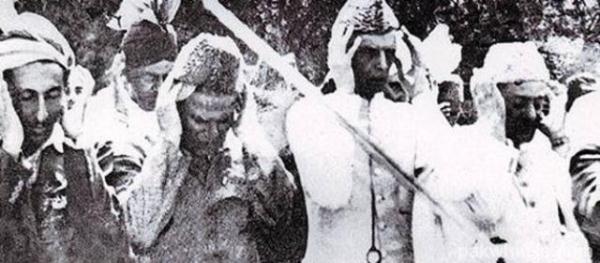In fact, the truth is that Jinnah was not even the original architect of the two-nation theory. VD Savarkar propounded it some three years earlier in his presidential address to the Hindu Mahasabha in December 1937.
One has to understand the chronology of the events rather than cherry picking the events.
1. Rulers of the land
The waning control of the Mughal Empire left the subcontinent open to new contenders for power from Europe. The British changed the course of history by penetrating India from the Bay of Bengal. In 1757 company forces defeated Mughal forces in Bengal in the Battle of Plassey. This victory marked the beginning of British dominance in the subcontinent. The company continued to expand the area under its control through military victories and direct annexations, as well as political agreements with local rulers. The British annexed the area of present-day Sindh Province in 1843. The region of Punjab, then under the control of the Sikh kingdom of Lahore, was annexed in 1849 after British forces won the second of two wars against the Sikhs. Some areas of Baluchistan were declared British territory in 1887.
2. Rise of the Indians
In the 1880s the British initiated political reforms that allowed the formation of political parties and local government like the Morley-Minto Reforms. The Indian National Congress was created in 1885 to advocate for Indian autonomy from British rule. Many Muslims, including Sir Syed Ahmad Khan believed the organization focused on Hindu interests, however, and in 1906 under the Muhammadan Educational Conference set up by Sir Syed Ahmad Khan, Muslims formed the Muslim League to represent their interests. Muslims demanded, and were granted, separate electorates in the Government of India Act of 1909. This guaranteed Muslims representation in the national and provincial legislative councils.

Both Muslims and Hindus demanded autonomy (self-government), and in 1919 constitutional reforms were introduced that gave the legislative councils greater authority. However, the reforms fell short of granting autonomy and did not satisfy political demands. The Amritsar Massacre of 1919 further galvanized nationalist, anti-British sentiment. The Muslims of India decided to launch a movement for the safeguard of the institution of Caliphate and to manifest their resentment over actions the Allies had taken in Turkey. A “Khilafat Committee” was set up with the support of Mulana Shaukat Ali and represented the peak of Muslim-Hindu relationships.
3. Muslim-Hindu conflicts
In 1928, an All Parties Conference was convened to solve the constitutional problems of India.A committee was set up under Pandit Lal Nehru.That committee prepared a report which is known as "Nehru Report".This report demanded "Dominion Status" for India.Separate electorates were refused and the reservation of seats for the Muslims of Bengal and Punjab was rejected.In this report,not a single demand of the Muslims was upheld.
Since Nehru Report was the last word from Hindus therefore Mr.Jinnah was authorized to draft in concise term the basis of any future constitution that was to be devised for India.Originally these demands were Fourteen in number and so they popularly came to be known as "Jinnah's Fourteen Points".
In March 1929 ,at the annual session of All india Muslim league,he declared his famous fourteen points.
4. Pakistan envisioned
The concept of an autonomous Muslim state was publicly proposed during the Allahābād session of the Muslim League in 1930 by the leading Muslim poet-philosopher in South Asia, Mohammad Iqbal. He envisioned a system in which areas that had Muslim majorities would constitute an autonomous state within India. During the next decade, this concept evolved into the demand for the partition of India into separate Muslim and Hindu nations, known as the Two Nations Theory. In 1940 Muslim League president Muhammad Ali Jinnah presided over the organization’s annual session, held that year at Lahore, in which the League made its first official demand for the partition of India. The Lahore Resolution called for an independent, sovereign Muslim state.
5. The Creation of Pakistan
During pre-independence talks in 1946, the British government found that the stand of the Muslim League on separation and that of the Congress on the territorial unity of India were irreconcilable. The British then decided on partition and on August 14, 1947, granted independence to Pakistan, when Jinnah arrived flaunting his suit and delivered his infamous speech, “Let us lay the foundations of our democracy on the true disciples of Islam.”
https://nation.com.pk/09-Aug-2017/5-key-pre-partiton-stages
I respectfully disagree with Mr. Thapar on few points.
Jinnah did eat pork but gradually began to realize his Muslim roots. Also his famous speech about non intereference of state in matters of faith does not necessarily mean secularism. It means espousing Islamic ideals of state craft like those practised by Hazrat Umar at the conquest of Jerusalem.
He also mentioned in another famous speech about ideals of Islamic state which practices rule of law and grants equal rights to all citizen.
There was no point in creating Pakistan if it was not an Islamic state but another secular state, the point that eludes non religious types.
For further info, please real book by Stanley Wolpert. A neutral writer who has not added any sentiment to the whole Jinnah story and his transformation.
Jinnah's life style was confirmed by many authors.
Who was Jinnah, an Islamic cultural relativist or a brown sahib?
By
Yasser Latif Hamdani Published: June 8, 2016
Jinnah wanted Pakistan the right way. PHOTO: FILE
There are two bar rooms in the Lahore High Court. One is considered the bar room of left liberals and progressives. The other bar room, much bigger of the two, is the favourite haunt of those with a tinge of religious right wing. The left leaning bar room has a photograph of an emaciated Mr Jinnah in a suit. The other one has a sombre portrait of him in a black sherwani and karakul cap. Next to his portrait is an equally serious portrait of Allama Iqbal.
In a
poignant piece for
Granta sometime ago
New York Times journalist Jane Perlez pointed out that one’s choice of Jinnah portrait could tell a lot about one’s ideological affiliations in Pakistan. But what was Jinnah’s own ideology? Was he a liberal or a conservative? Which of the two bar rooms would he sit in if he were here today?
His background and training gives us a clue. Muhammad Ali Jinnah, the Quaid-e-Azam and the founding father of Pakistan,
was born into an Ismaili household as Muhammadali Jinnahbhai, though he became a Khoja Ithna Ashari Shia in 1901 after the Agha Khan
refused to bless his sister’s marriage outside the Ismaili community.
Earlier he had changed his name to Muhammad Ali Jinnah
while at Lincoln’s Inn in 1892 arguing that the suffix “bhai” was rudimentary because in his view “bhai” and “mister” were interchangeable. Like all barristers, however, he was most commonly referred by his peers as “Jinnah” or “Mr Jinnah” depending on who addressed him.
His time at the Bombay bar suggests that young Mr Jinnah identified himself first and foremost as a modern Indian. To him most religious practices were either meaningless rituals or useless superstitions. Dietary restrictions were summarily rejected by him. From all accounts he ate and drank at Bombay’s finest eateries like Cornaglia’s Restaurant. These eateries did not serve halal food and that did not seem to bother him in the least. Indeed he was the embodiment of Macaulay’s ideal Indian, an Indian by skin and name but an Englishman in tastes and habits. From his time in London, he also imbibed the best that British liberalism had to offer, rejecting racial distinctions and tribal associations as relics of the past.
His commitment to this British brand of liberalism was so strong, that he was amongst the
earliest supporters of the Suffragette Movement in Britain.
The left leaning bar room has a photograph of an emaciated Mr Jinnah in a suit.
Photo: Jinnah Blog post
For a decade and a half, Jinnah was Bombay’s most eligible bachelor and its leading politician. In 1918 he, in the immortal words of Sarojini Naidu, plucked the blue flower of his desire.
Ruttie Petit, the daughter of Parsi magnet Dinshaw Petit, had to convert to Islam. This had to do with the law which required, in the event of an inter-communal marriage, either renunciation of faith by both parties or conversion by one.
Jinnah, by
now elected on a Muslim constituency, had to retain his religious identity. It was well known, however, in Bombay’s circles that Ruttie Jinnah’s conversion to Islam was merely in name. Instead of becoming a Muslim wife, Ruttie freely dabbled in theosophy and even
delivered lectures on it in Duke University in the US.
Meanwhile her strapless dresses often created scandals. On two separate occasions,
Jinnah walked out with his wife, after a host chided Ruttie for wearing strapless dresses. Once was at a dinner with Lord and Lady Wellingdon. The second was when the Begum of Bhopal told Ruttie that she was a Muslim now and that she should dress accordingly. Jinnah’s reaction on both occasions is instructive.
Politics often decides its own course. Jinnah’s politics continuously evolved from 1906 when he joined the Congress to the time he took office as Pakistan’s
first Governor General. Much has been written about it. There is no dispute, even amongst his worst critics, that from 1906 right up to 1937, Jinnah’s politics were
completely secular.
During this period he saw himself as an Indian first, second and last and was unwaveringly committed to the ideal of a united and independent India. It was only after 1937,
after failingto secure an equitable power sharing arrangement with the Congress in UP, that Jinnah turned his attention to consolidating the Muslim community as a voting bloc. It is a fact that even when Jinnah took up the Muslim cause, his idea of Islam was informed not by the religious orthodoxy, but by a modernist interpretation of Islam.
This was a time, when the modernists in the Muslim intelligentsia far outnumbered the religiously orthodox. The binary of secular versus religious just did not exist for the modernist Muslims of the Muslim League. This is why for Jinnah there was no contradiction in speaking about Islamic principles of justice and fair play in one speech and speaking of religion as a personal matter in another.
Laws; whether religious or secular, in Jinnah’s estimation could only be drafted, discussed and enacted by modern men and women elected through the ballot. All citizens of Pakistan regardless of their religion or gender would be equal citizens of the new state.
Jinnah made it absolutely clear that Pakistan would not be a theocracy to be run by priests with a divine mission. There was no space for a
Council of Islamic Ideology and the Federal Shariat Court in this vision. Nor could he have imagined that one day Pakistan’s National Assembly would decide whether a particular sect
is Muslim or not.
Was he a liberal or a conservative?
Photo: Pakwheels
So which picture of the Quaid-e-Azam is based on fact? And which is fiction?
General Ziaul Haq’s
Islamising government in the 80s actively censored his photographs in suits, his photographs with dogs, and him smoking cigars. Instead the Zia government tried to project him as an Islamic cultural relativist, which was the farthest from what he was.
Take it or leave it but Jinnah was the embodiment of the term “brown sahib”. He smoked, drank and ate as he pleased, all the while dressed in immaculate three piece suits and two tone shoes. As a politician trying to mobilise the masses, he did don the sherwani and karakul for select public occasions but that was an exception, not the rule. When the Islamists and conservatives try to find a puritan and a fundamentalist in Jinnah they are sorely disappointed. This is why they insist on elevating
Allama Iqbal, the true cultural relativist as his equal as a founding father.
Nor should left liberals and secularists expect to find a consistent and an ideologically pure secular position in Jinnah’s politics post 1937. He was a great advocate and a
master politicianbut never an ideologue. Jinnah was essentially a liberal and modern man who nevertheless was a pragmatist catering to the idiom of his people.
We must therefore study Jinnah holistically as a great practitioner of the art of politics. We should refrain from retrofitting our own ideologies on him.
https://blogs.tribune.com.pk/story/...islamic-cultural-relativist-or-a-brown-sahib/
In fact, the truth is that Jinnah was not even the original architect of the two-nation theory. VD Savarkar propounded it some three years earlier in his presidential address to the Hindu Mahasabha in December 1937.
And what about Choudhary Rahmat Ali's pamphlet of 1933?
Full text of the pamphlet "Now or Never," published by Choudhary Rahmat Ali as "Founder of Pakistan National Movement," in which the word "Pakistan" appears to have been used for the first time in a document (1933)
3, Humberstone Road,
Cambridge, England.
28th January, 1933
Dear Sir or Madam,
I am enclosing herewith an appeal on behalf of the thirty million Muslims of PAKISTAN, who live in the five Northern Units of India--Punjab, North-West Frontier (Afghan) Province, Kashmir, Sind, and Baluchistan. It embodies their demand for the recognition of their national status, as distinct from the other inhabitants of India, by the grant to Pakistan of a separate Federal Constitution on religious, social and historical grounds.
I shall be pleased if you will kindly acquaint me with your valuable opinion on the proposed solution of the great Hindu-Muslim problem. I trust that, vitally interested as you are in a just and permanent solution of that complex problem, the objects outlined in the appeal wiIl meet with your fullest approval and active support.
Yours truly,
Rahmat Ali (Choudhary). (Founder, Pakiistan National Movement)
First issued 1933; reissued 1934
NOW OR NEVER
Are we to live or perish for ever?
[1] At this solemn hour in the history of India, when British and Indian delegates are laying the foundations of a Federal Constitution for that Sub-continent, we address this appeal to you, in the name of our common heritage, and on behalf of our thirty million Muslim brethern who live in PAKISTAN by which we mean the five Northern units of India viz: Punjab, North-West Frontier Province (Afghan Province), Kashmir, Sind, and Baluchistan. And we ask for your sympathy and support in our grim and fateful struggle against political crucifixion and national annihilation.
[2] Our brave but voiceless nation is being sacrificed on the altar of Hindu Nationalism not ony by the non-Muslims, but also, to their lasting shame, by our own so-called leaders with a reckless disregard of our protests and in utter eontempt of the warnings of history.
[3] The Muslim Delegates at the Round Table Conference have committed an inexcusable blunder and an incredible betrayal. They have agreed, in the name of Hindu Nationalism, to the perpetual subjection of the ill-starred Muslim Millat in India. They have accepted, without any protest or demur and without any reservation or qualification, a constitution based on the principle of an All-India Federation. This acceptance amounts to nothing less than signing the death-warrant of Islam and of Muslims in India.
[4] To justify their action they have taken shelter behind the so-called Mandate from the Millat. But they forgot that sucidal Mandate was framed and formulated by thedr own hands. It was not the Mandate of the Muslims of India. Nations never gave Mandates to their representatives to barter away their very souls; and men of conscience never accept such self-annihilating Mandates, even if given, much less execute them. At such a time and in a crisis of this magnitude the foremost duty of saving statesmanship is to give a fair, firm, and fearless lead--a lead which has presistently been denied to our eighty million co-religionists in India by our leaders during the last seventy-five years. In fact, for us, these have been the years of false issues, of lost opportunities, and of utter blindness to the most essential and urgent needs of the Muslim interests. This because the leaders' policy has throughout been defeatist in spirit, nerveless in action, and subservient in attitude. They have all along been paralysed with dishonesty, fear, and doubt, and have, time and again, sacrificed their own political principles and our national patrimony for the sake of sheer opportunism and sordid careerism. To do so even at this fateful juncture is a policy of betrayal. It will be fatal for. us not to look this tragic truth in the face; for the tighter we shut our eyes, the harder that truth will hit us.
[5] At this critical moment, when this tragedy is being enacted, we earnestly appeal to you for your practical sympathy and active support for the demand of a separate Muslim Federation--a demand which is a matter of life and death for all Muslims of India, and which is outlined and explained below.
[6] India, constituted as it is at the present moment, is not the name of one single country; nor the home of one single nation. It is, in fact, the designation of a State created by the British for the first time in history. It includes peoples who have never previously formed part of the Indian nation at any period of its history, but who have, on the contrary, from the dawn of history till the advent of the British, possessed and retained distinct nationalities of their own.
[7] One of such peoples is our own nation. In the five Northern Provinces of India, out of a total population of about forty millions, we, the Muslims, constitute about thirty millions. Our religion and culture, our history and tradition, our social code and economic system, our laws of inheritance, succession and marriage are fundamentally different from those of most peoples living in the rest of India. The ideals which move our people to make the highest sacrifices are essentially different from those which inspire the Hindus to do the same. These differences are not confined to broad, basic principles. Far from it, they extend to the minutest details of our lives. We do not inter-dine; we do not inter-marry. Our national customs and calendars, even our diet and dress are different.
[8] It is preposterous to compare, as some superficial observers do, the differences between Muslims and Hindus with those between Catholics and Protestants. While both the Catholics and the Protestants are part and parcel of one religious system Christianity, the Muslims and the Hindus are the followers of two essentially different religious systems. Moreover, religion in the case of Muslims and Hindus is not a matter of private opinion as it may be in the case of Christians; but on the contrary it is a Civic Church, which lays down a most comprehensive code of conduct to be observed by its adherents from birth to death.
[9] If we, the Muslims of Pakistan, with our distinct marks of nationality, are deluded into the proposed Indian Federation by friends or foes, we are reduced to a minority of one in ten. This reduction sounds the death-knell of our nation in Pakistan. To help you to realise the full magnitude of this impending catastrophe, let us remind you that we thirty mlllions constitute about one-tenth of the whole Muslim world. The total area of our five units, comprising Pakistan, is four times that of Italy, three times that of Germany and twice that of France; and their population seven times that of the Commonwealth of Australia, four times that of the Dominion of Canada, twice that of Spain, and equal to France and Italy considered individually.
[10] These are facts--hard facts and historic realities which we challenge anybody to contradict. It is on the basis of such facts and realities that we assert without fear of contradiction that we, the Muslims of Pakistan, do possess a distinct nationality from that of the Hindus of India, who constitute the Hindu nation and live--and have every right to live--in most of India; and that we deserve--and demand--the recognition of our national status by the grant to Pakistan of a Federal Constitution, separate from that of the rest of India.
[11] In addressing this appeal to you and all other Muslims of India, we are addressing it also to the two other major parties--British and Hindu--involved in the settlement of India's future. They must understand that, in this settlement, our body and soul are at stake. Our very being and well-being depend upon it. Not only ours, but also those of every other people in India. Therefore, to be acceptable to all, the settlement must be fair to all. They can make it so, if they will.
[12] This is especially true when, to the selfish settlement proposed by them, there is a just and reasonable alternative, which would lay the foundations of a peaceful future for the whole Sub-continent; and which would allow the highest development of all, including each of the two peoples--the Hindu and the Muslim--without either being subject to the other. This alternative is a separate Muslim Federation of at least our five predominantly Muslim units-Punjab, NorthWest Frontier Province (Afghan Province), Kashmir, Sind and Baluchistan. This Muslim Federation of North-West. India would provide the bulwark of a buffer state against invasion of India either of ideas or of arms from any quarter. And the creation of such a Federation would not materially disturb the ratio or the rights of the Muslim and Hindu populations in the rest of India. It is, therefore, clearly in the interest of British and Hindu statesmanship to concede our demand for this Federation, and to have as an ally our free, powerful, and contented Muslim nation, possessing a constitution similar to, but separate from, that which is being enacted for India. For, nothing but a separate Federation of our homelands will satisfy our people.
[13] This demand is basically different from the suggestion put forward by Doctor Sir Muhammad Iqbal in his Presidential address to the All-India Muslim League in 1930. While he proposed the amalgamation of four out of the five above-named provinces into a single state, forming a unit of the All-India Federation, we propose that all those five Provinces should have a separate Federation of their own outside India. We are convinced there can be no peace and progress in India if we, the Muslims, are duped into a Hindu-dominated federation in which we cannot be the masters of our own destiny and captains of our own souls.
[14] Let us refer here to the safeguards. Do the safeguards proposed at the Conference give us any scope to work out our salvation along our own lines? Not a bit. Safeguard is the magic word which holds our leaders spellbound, and has dulled their consciences. In the ecstasy of their hallucinations they think that the pills of safeguards can cure nation-annihilating earthquakes. The safeguards asked for by them and agreed to by the makers of the Constitution can never be a substitute for tbe loss of our separate nationality. Indeed, to believe otherwise is suicidal insanity. For, what safeguards can be devised to prevent our minority of one in ten in an All-India Federation from being sacrificed on every vital issue to the aims and interests of the majority race, which differs from us in every essential of individual and corporate life? What safeguards can prevent the catastrophe of our Muslim nation smarting and suffering eternally at the frustration of its every social and religious ideal? What safeguards can compensate our nation awakened to its national consciousness for the destruction of its distinct national status? None. Because, however effective and extensive the safeguards may be, the vital organs and essential departments of our national life, such as defence forces and foreign relations, trade and commerce, communications, posts and telegraphs, finance, taxation and customs, will not be under our control, but will be in the hands of a Federal Government, which is bound to be overwhelmingly Hindu. With all this, can we, Muslims, achieve any of our ideals, if those ideals conflict--as conflict they must--with the ideals of the Hindus?
[15] In this respect, the history of the last century is full of clear warnings for us. Even one who runs may read them. To mention just one. Despite all the safeguards and guarantees we have had in the past, the very name of our national language-Urdu--even now the lingua franca of the Indian Sub-continent, has been wiped out of the list of Indian languages. We have only to open the latest census report to verify it. This by itself is a tragic fall. But even that is a trifle in comparison with the tremendous issues involving our whole future as a nation and as a power not only in India, but also in the whole of Asia.
[16] In the face of these incontrovertible facts, we are entitled to ask our delegates for what purpose we are being pressed to sacrifice our nationality and to submit ourselves and our posterity to non-Muslim domination. What good is likely to accrue to Islam and Muslims by our going into the Indian F'ederation? This is a thing which passes our understanding. Are we to be crucified just to save their faces, or to bolster up the preposterous falsehood that India can be a single nation? Is it to achieve compromise at all costs, or is it to support the fatal illusion that Hindu nationalism can work in the interests of Muslims as well as Hindus? The whole business shows a mental muddle of such a nature and on such a scale as has never been known in history. We have suffered in the past without a murmur and faced dangers without demur; but the one thing we would never suffer is our self-strangulation. We would never crucify ourselves upon the cross of Hindu nationalism in order to make a Hindu-holiday.
[17] May we ask also all those people--Muslim, British, and Hindu--who are supporting the Federal Constitution, if it is really desirable to make us sacrifice our nationhood in order to make India one nation? Does humanity really stand to gain by this stupendous sacrifice? We dare to say that in our nation the ancient fire of Islam still glows and promises much for the future of mankind, if only they would let it live. Can they not realize that, while in Europe, excluding Russia, in about the same area as that of India and with about the same population, there live and prosper no fewer than twenty-six nations, with one and the same religion, civilisation and economic system, surely it is not only possible but highly desirable for two fundamentally different and distinct nations, i.e., Muslim and Hindu, to live as friendly neighbours in the Indian Sub-continent. It is a pity that even our leaders have not the courage to take their stand upon that truth and to insist upon its application to India and thereby secure the minimum for our national salvation.
[18] In any case, we are now face to face with a first-rate crisis, the like of which has not been seen even in the long and eventful history of Islam. It is not the question of a sect or of a community going down; it is the crisis of the whole future of our eighty million Muslims, who, till only yesterday, were the custodians of the glory of Islam in India and the defenders of the frontiers of India.
[19] Such is the nature of this crisis. Dangerous as it is, there is no need to despair. We can survive it, and have a still greater future, if only we all answer this appeal like Muslims, oppose the Indian Federation, and support the Pakistan Federation and do that at once.
[20] Let us make no mistake about it. The issue is now or never. Either we live or perish for ever. The future is ours, if we live up to our faith. It does not lie in the lap of the gods: it rests in our own hands. We alone can make or mar it. The history of the last century is full of open warnings to us, and they are as plain as were ever given to any nation. Shall it be said of us that we ignored all those warnings, betrayed our ancient nationhood into the Indian Federation, and let our Islamic heritage perish throughout the Sub-continent of India?
Rahmat Ali
(Choudhary )
Mohd. Aslam Khan
(Khattak)
Sheikh Mohd. Sadiq
(Sahibzada)
Inayat Ullah Khan
(of Charsaddah)
http://www.columbia.edu/itc/mealac/pritchett/00islamlinks/txt_rahmatali_1933.html










